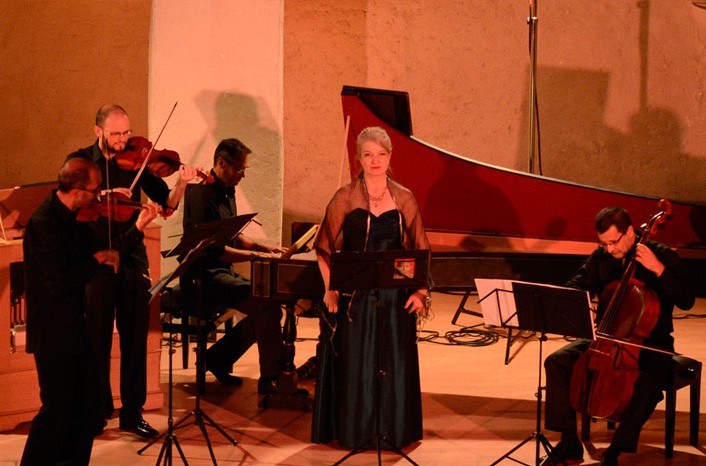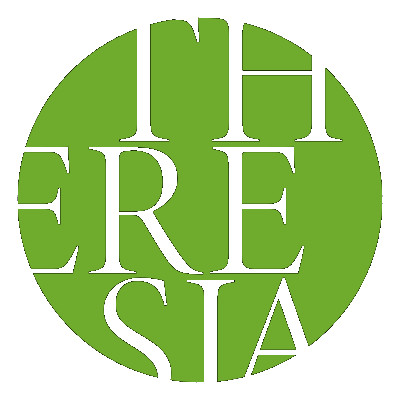
Quest’anno compie 25 anni e li festeggia alla grande: Antiqua, il Festival bolzanino cuore barocco del Bolzano Festival Bozen, soffia su una bella schiera di candeline, con un ricco cartellone che tra gli altri schiera la EUBO, Jordi Savall, e lo storico ensemble “in residence” Harmonices Mundi. E non poteva mancare Theresia, ospite fissa del BFB che con Antiqua ha un legame di affetto speciale.
Venticinque anni non sono pochi, e a guardare indietro si ripercorre un bel pezzo di vita e di storia: perchè, come ci racconta Claudio Astronio, direttore di Antiqua fin dagli esordi, “la realtà culturale 25 anni fa era profondamente diversa: a Bolzano non c’era nulla che desse la possibilità di ascoltare musica antica e assieme ad alcuni allievi mettemmo su questa piccola associazione: all’inizio l’attività era limitata, quattro concerti nella Chiesa di Gries, con il supporto del Convento dei Benedettini. Si esibivano soprattutto amici e colleghi – tuttora in attività – che venivano a suonare per farci un piacere. Insomma, è nata come una cosa piccola e ‘povera’: ma poi le istituzioni ci hanno creduto, abbiamo avuto sostegno e Antiqua è cresciuta fino a diventare quello che è ora, uno dei festival in attività più longevi d’Italia.”
Quali sono stati i momenti più significativi in questi 25 anni?
“E’ difficile rispondere: all’inizio immaginavamo cose che ci sembravano irrealizzabili che poi invece si sono realizzate, da lì si va avanti con nuove idee… ad esempio quando è nata Antiqua mai avremmo pensato che avremmo ospitato artisti come Gustav Leonhardt, Emma Kirkby, il London Baroque: insomma, i grandi della musica barocca. Però forse il momento più significativo è stato 15 anni fa, quando abbiamo pensato che Antiqua dovesse diventare altro da quello che era in quel momento, ovvero una vetrina dell’esecuzione su strumenti storici rivolta al pubblico dell’Alto Adige: abbiamo capito che potevamo andare oltre, lanciandoci nella sperimentazione, per trovare commistioni con il teatro, la musica contemporanea, l’arte, la poesia.”
A livello organizzativo a un certo punto c’è stata l’inclusione nel più ampio cartellone del Bolzano Festival:
“Entrammo nel Bolzano Festival alla seconda edizione: fu Peter Paul Kainrath a volere Antiqua, mi chiamò dicendomi che il nostro Festival doveva assolutamente entrare nella programmazione. Per noi è stata una cosa estremamente positiva, ha cambiato il nostro modo di lavorare – non però i contenuti del nostro lavoro – e ci ha dato la possibilità di far parte di un Festival meraviglioso in cui sentire una sera musica barocca, il giorno dopo una grande orchestra sinfonica, poi un pianista del Busoni e anche realtà più territoriali.”
L’edizione di quest’anno ha un titolo particolare, “Augmented reality”: in che modo questa espressione – attualissima per molti versi – si lega al programma del Festival?
“Come dicevo Antiqua si è sviluppata nel senso della sperimentazione e di uno sguardo che sappia andare oltre la consuetudine, anche attirando nuovo pubblico, permettendo anche a chi non frequenta abitualmente le sale da concerto di vivere un’esperienza particolare ascoltando una serata di musica barocca o classica. L’espressione “Augmented Reality” richiama quella percezione modificata delle cose che è quasi inconsapevolmente automatica: sempre più guardiamo le cose dentro schermi, perdendo contatto con l’oggettività della realtà. Questa percezione modificata la ritroviamo nell’ultimo appuntamento del Festival, un spettacolo ideato dalla clavicembalista finlandese Marianna Henrikkson dal titolo “Di anima et di corpo”, come il primo oratorio composto da Emilio Cavalieri. Non è un concerto nè un’opera, ma un progetto multiartistico e multitecnologico che comprende l’uso di regia e testi e apre nuovi scenari sulla performance: per quello che mi riguarda, è uno spettacolo che dopo tanti anni di ascolto della musica antica per la prima volta mi ha fatto provare un autentico shock.”
Quali altre chicche ci riserva quest’edizione?
“Sul fronte delle sperimentazioni avremo la clavicembalista Elina Mustonen con un concerto tutto dedicato a un tema caro alle leggende finlandesi, quello degli uccelli, accompagnata da uno slideshow naturalmente in tema: in programma anche un brano composto dal fratello, il famoso pianista Olli Mustonen. E poi meno avanguardista ma sicuramente di forte impatto un concerto dell’orchestra Harmonices Mundi che al Parco delle Semirurali, quindi en plein air, eseguirà le famosissime “Quattro stagioni”, con un’amplificazione da rock band: un sound più vicino ai Led Zeppelin che a Vivaldi. Poi abbiamo degli appuntamenti diciamo più tradizionali: gli ospiti d’onore sono sicuramente Jordi Savall, per la prima volta in Alto Adige, e l’European Union Baroque Orchestra; e naturalmente torna Theresia Youth Baroque Orchestra, che sarà diretta da Alfredo Bernardini.”
[title above=”” h1=”false” center=”true”]Antiqua, 25 years of passion[/title]
This year it turns 25, and the celebrations will be great! The Festival “Antiqua”, baroque heart of the Bolzano Festival Bozen, is going to blow out a wide array of candles, with a rich program hosting among the others Eubo, Jordi Savall and the ensemble Harmonices Mundi. Theresia couldn’t miss: our orchestra is a regular guest of BFB and an Antiqua’s old friend.
25 years aren’t a few, and looking back one goes over a long stretch of life and story. As a matter of fact, as Claudio Astronio, Antiqua’s director from the very beginning, tells us, “25 years ago the cultural situation was deeply different: in Bozen there was nothing to listen baroque music so I and a group of my students decided to create this small association: we started organizing just four concerts in the Gries’s Church, with the support of Benedictine Monastery. Performers were mostly friends and colleagues – which are still active – who used to come and play as a personal favor. But then institutions began to believe in our work, they sustained us and Antiqua has grown to become what it is now, one of the longest running festivals in Italy.”
What were the most important moments in these 25 years?
“It is difficult to answer: at the beginning we used to imagine things that seemed impossible and then we have made them; from there we went forward with new ideas… for example, when Antiqua was born, we never thought that we would have hosted artists such as Gustav Leonhardt, Emma Kirkby, the London Baroque: in short, the greatest baroque musicians. But perhaps the most significant moment was 15 years ago, when we thought Antiqua were to become something different from what it was at that moment, a window on historical performances intended for the South Tyrol audience: we realized that we could go over, launching into experimenting to find commingling with theater, contemporary music, art, poetry.”
At a certain point at an organizational level, there was a major change: the inclusion in the wider program of the Bolzano Festival:
“We entered the Bolzano Festival in its second edition: Peter Paul Kainrath was the one who wanted Antiqua, he called me and said that we absolutely had to get into the BFB programming. For us it was a very positive thing, changed the way we work – not, however, the content of our work – and gave us the opportunity to be part of a wonderful Festival, where one night one hears baroque music, the day after a large symphony orchestra, then one of Busoni pianists and so on… “
This year’s edition has a particular title, “Augmented reality”: how this expression – very current in many ways – is bound to the Festival program?
“As I said, Antiqua has developed in the sense of experimentation, looking beyond the usual: we are trying to attract new audiences, allowing those who do not regularly participate halls to live a special concert experience concert, listening to a baroque or classical music event.
The expression “Augmented Reality” recalls the modified perception of things which today is almost unconsciously automatic: we increasingly look at things inside screens, losing contact with the objectivity of reality. We find how this perception changed in the last date of the Festival, a show created by the Finnish harpsichordist Marianna Henriksson entitled “The soul et Body”, as the first oratorio composed by Emilio Cavalieri.
It is not a concert nor an opera, but a multi-art and multitechnological project, which includes the use of direction and texts and it opens new scenarios on performance: for what concerns me, it is a show that, after so many years of listening to ancient music, for the first time made me feel a real shock. ”
Which other surprises are waiting for us?
“With regard to experimentation, we will have the harpsichordist Elina Mustonen with a concert entirely devoted to a theme dear to the Finnish legends, that of birds, accompanied by a slide show of course on the subject: she will also play a piece composed by his brother, the famous pianist Olli Mustonen. And then, less avant-garde, but definitely of a strong impact, we will have a concert by the orchestra Harmonices Mundi in the Semi Rural Public Garden, en plein air: the orchestra will perform the famous “Four seasons”, amplified as a rock band:
a sound close to Led Zeppelin more than to Vivaldi. Then we’ll have the most traditional events: the guests of honor are definitely Jordi Savall, for the first time in South Tyrol, and the European Union Baroque Orchestra; and of course Theresia Youth Baroque Orchestra, which will be conducted by Alfredo Bernardini. “


